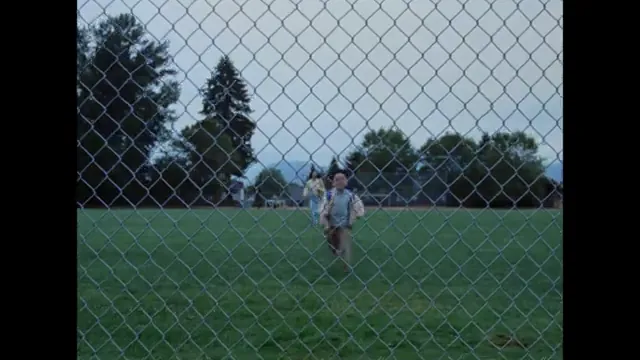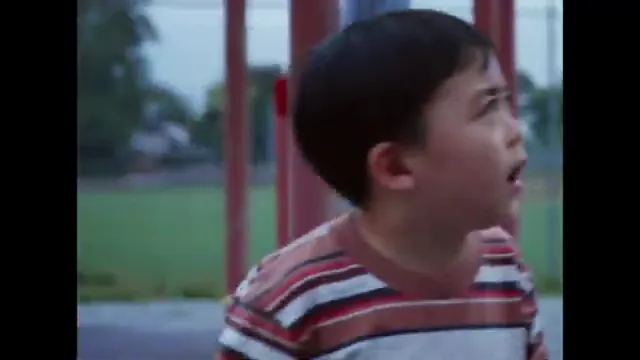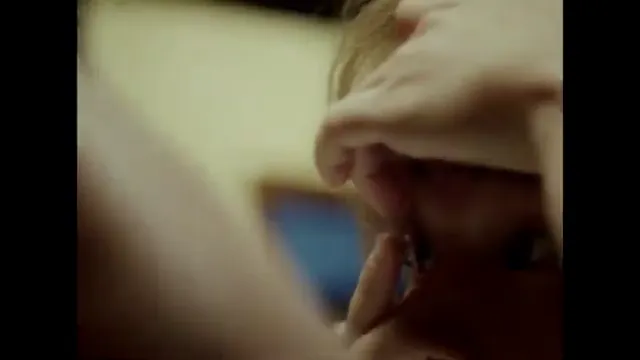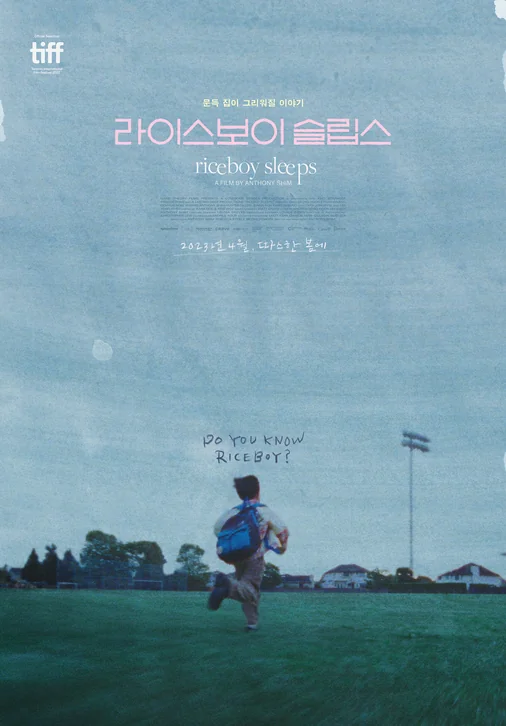🎯 Quick Overview
Trailer
- Director: Anthony Shim
- Genre: Drama, Family
- Release year: 2022
- Runtime (length): 1h 57min
- IMDb rating: 7.6/10 (2.2K votes)
- Rotten Tomatoes: 100%
😅 Plot Summary – Badly Explained
A single Korean mom moves to Canada in the 90s, hoping her kid will like poutine, but instead, they just end up with a lot of feelings and a surprise trip back to where they started.
🍿 Riceboy Sleeps: Detailed Plot Synopsis
A New Life in Canada: Early Challenges
Set in the 1990s, ‘Riceboy Sleeps’ introduces So-Young, a single Korean mother, who immigrates to Canada with her young son, Dong-Hyun. They arrive in the suburbs, seeking a better life than the one So-Young left behind in South Korea, where her husband had tragically died by suicide. Dong-Hyun faces immediate challenges in elementary school, encountering language barriers and subtle, and sometimes overt, racial discrimination from peers and even school authorities. So-Young, too, navigates cultural differences and prejudice in her efforts to find stable work and provide for her son. The film highlights their struggles to adapt and belong in a new country, emphasizing So-Young’s unwavering determination to secure a better future for Dong-Hyun.

Navigating Adolescence: Identity and Growing Pains
Years later, Dong-Hyun has grown into a teenager, seemingly more assimilated into Canadian culture. He prefers speaking English, creating a subtle but noticeable cultural and linguistic gap with his mother, who continues to speak Korean. This period explores Dong-Hyun’s coming-of-age challenges, including his search for identity and fitting in amidst peer pressures. So-Young continues to work diligently, and a potential new relationship enters her life, prompting her to consider expanding their small family. Meanwhile, Dong-Hyun begins to ask more questions about his deceased father and his family roots in Korea, igniting a curiosity about the heritage he left behind.

An Unexpected Diagnosis and a Journey Back Home
The family’s trajectory takes a profound turn when So-Young receives a devastating diagnosis: pancreatic cancer. Faced with her own mortality, she makes a pivotal decision to return to South Korea with Dong-Hyun. This journey is not just for her own closure but crucially to allow Dong-Hyun to connect with his roots, meet his paternal grandparents, and understand the family and culture he originated from. The trip becomes a transformative experience, offering both mother and son a chance to confront their past, heal old wounds, and strengthen their bond amidst the backdrop of So-Young’s declining health. The film emphasizes the emotional weight of returning to a place that is both familiar and foreign, and the significance of heritage in the face of an uncertain future.

⚠️ Spoilers and Ending Explained
🎬 Cast & Characters
- So-Young (Choi Seung-yoon): A resilient Korean single mother who immigrates to Canada in the 90s, determined to build a better life for her son despite facing cultural conflicts and personal hardships.
- Dong-Hyun (Dohyun Noel Hwang (Child) / Ethan Hwang (Teen)): So-Young’s young son who navigates identity struggles and cultural adaptation as an immigrant in Canada throughout his childhood and teenage years.
- Simon (Anthony Shim): So-Young’s supportive boyfriend in Canada, who offers companionship and understanding in her new life.
- Grandpa (Choi Jong-ryul): Dong-Hyun’s grandfather in Korea, who represents the family’s deep roots and cultural heritage during their return visit.
- Grandma (Lee Yong-nyeo): Dong-Hyun’s grandmother in Korea, who welcomes the family and embodies the traditional Korean family bond.
- Principal Lafferty (Eric Keenleyside): A school authority figure who highlights the institutional biases and challenges faced by Dong-Hyun and So-Young in their new environment.
- Dr. Rydell (John Cassini): The doctor who delivers pivotal health news to So-Young, significantly impacting her life and her relationship with her son.
💬 Memorable Quotes
- So-Young: “We came here for a better life. You have to try.” – So-Young often repeats this sentiment to Dong-Hyun, emphasizing her sacrifices and determination to provide a successful future for him in Canada.
- So-Young: “He is my son. You will not talk about him like that.” – Said with fierce protectiveness by So-Young during confrontations with school officials or others who dismiss or discriminate against Dong-Hyun.
- Dong-Hyun: “I don’t fit in. Not here, not there.” – Dong-Hyun expresses his feeling of alienation and identity struggle, caught between his Korean heritage and his Canadian upbringing, particularly during his teenage years.
- So-Young: “You need to know where you come from, Dong-Hyun.” – As So-Young faces her own mortality, she emphasizes the importance of Dong-Hyun connecting with his roots and understanding his family history in Korea.
- Dong-Hyun: “It feels… different. Like I belong.” – Dong-Hyun says this during their trip to Korea, acknowledging a sense of comfort and belonging he hadn’t fully experienced in Canada.
💰Box Office
- Budget: N/A
- Domestic Gross: N/A
- Worldwide Gross: $449,303
💥 Riceboy Sleeps Reviews
Personal Review
I wasn’t really sure what to expect from ‘Riceboy Sleeps,’ but wow, this movie truly resonated with me. The way it portrayed the struggles of a single immigrant mother and her son growing up in 90s Canada felt incredibly real and personal. I found myself tearing up multiple times, especially during the quiet moments where So-Young just tried her best for Dong-Hyun, facing everything with such resilience. The film’s pacing felt so natural, like I was watching memories unfold, and the way the aspect ratio subtly changed as the story progressed was an incredibly cool and effective touch. And that trip back to Korea in the final act? It hit me right in the feels, highlighting the complexities of identity and roots. This isn’t a loud, flashy movie, but its emotional impact is absolutely deafening in the best possible way. It left me reflecting on my own family and connection to home for days.
- Who would enjoy:
- “Fans of character-driven dramas and coming-of-age stories”
- “Viewers interested in the immigrant experience and cultural identity”
- “Audiences who appreciate sensitive and realistic portrayals of family dynamics”
- “Those who enjoy films like ‘Minari’ or ‘The Farewell'”
- “Individuals looking for emotionally impactful and thought-provoking cinema”
- Content warnings ⚠:
- “Themes of racial discrimination and bullying”
- “Discussions and portrayal of terminal illness (pancreatic cancer)”
- “Implied discussion of suicide (in backstory of father)”
- “Emotional intensity and themes of grief and loss”
Professional Reviews
- IndieWire: “Anthony Shim’s ‘Riceboy Sleeps’ is a profoundly moving and authentic portrayal of an immigrant mother and son navigating the complexities of new beginnings. The film avoids melodrama, instead opting for a quiet power that seeps into your soul, driven by a deeply felt central performance and an intimate, evolving cinematography. It’s a testament to the struggles of assimilation and the enduring strength of familial bonds. A truly special viewing experience.
- The Film Stage: “‘Riceboy Sleeps’ offers a raw, unfiltered look at identity and belonging, captured with remarkable nuance. Shim masterfully crafts a narrative that feels both deeply personal and universally resonant, allowing the audience to truly inhabit the characters’ emotional landscape. The changing aspect ratios and the film’s grainy aesthetic add a layer of nostalgic realism, making it feel less like a movie and more like a cherished memory unfolding before your eyes.
Audience Reactions
Many viewers were deeply moved by the film’s raw authenticity and the powerful mother-son bond.: Audiences consistently lauded the realistic depiction of immigrant life, cultural struggles, and the understated yet impactful performances, particularly praising the lead actress, Choi Seung-yoon.
The film’s unique cinematography, including aspect ratio changes, was often cited as a standout artistic choice.: The nostalgic 90s setting and the journey to self-discovery in Korea were highly appreciated, making the film feel both timeless and deeply personal for many.
Overall Consensus: Riceboy Sleeps is widely praised as a profoundly moving and authentic drama, lauded for its sensitive portrayal of immigrant life, strong performances, and unique cinematic approach that resonates deeply with audiences.
Awards
🛠️ Behind the Scenes
- “The film is deeply personal to director Anthony Shim, who also wrote the screenplay and stars in a supporting role as Simon. Scenes were shot in the actual locations where Shim grew up, and the segments in Korea were filmed in his family’s ancestral village, adding a layer of authenticity.”
- “Director Anthony Shim intentionally utilized varying aspect ratios and film stocks to reflect the characters’ emotional journey and the passage of time. The early scenes in Canada are presented in a 4:3 aspect ratio with a grainy texture, evoking a nostalgic, almost home-video feel of the 90s, while the final act in Korea expands to a wider aspect ratio, signaling a shift in perspective and openness.”
- “The movie was shot on real film stock, contributing to its distinct ‘aged feeling’ and grainy texture, which many viewers noted enhanced the sense of watching someone’s memory or a personal home video.”
🖥️ How to Watch Riceboy Sleeps?
As of its initial release, ‘Riceboy Sleeps’ premiered in Canadian theaters and has been featured at various international film festivals. While specific streaming platforms may vary by region and over time, it is generally available for digital purchase or rental on platforms like Apple TV, Prime Video, Google Play, and YouTube. We recommend checking these services for the most current availability. Keep an eye on major streaming services as critical acclaim often leads to broader distribution.

🎥 Similar Movies
If you enjoyed Riceboy Sleeps, you might like these similar films:
- Minari (2020): Both films explore the struggles and triumphs of a Korean immigrant family navigating a new life in North America, focusing on themes of cultural identity, family bonds, and the pursuit of the ‘American (or Canadian) Dream.’
- The Farewell (2019): Explores the complexities of cultural differences, family expectations, and the bittersweet experience of reconnecting with one’s ancestral homeland, echoing ‘Riceboy Sleeps”s journey to Korea.
- Past Lives (2023): A contemporary drama that delves into the themes of Korean identity, migration, longing, and destiny across continents, offering a deeply emotional and reflective look at cultural ties and paths not taken.
- Slums of Beverly Hills (1998): Set in the 90s, this coming-of-age drama follows a young girl navigating adolescence and family struggles amidst constant change, capturing a specific era’s feel and a relatable journey of self-discovery.
- Moonlight (2016): Praised for its understated, visually rich, and character-driven exploration of identity and coming-of-age over different life stages, appealing to fans of art-house cinema and poignant, realistic dramas.
🛒 Riceboy Sleeps Related Products
- Riceboy Sleeps (Collector’s Edition Blu-ray/DVD): Dive deeper into the acclaimed film with a special edition featuring director’s commentary by Anthony Shim, behind-the-scenes footage, and exclusive interviews exploring the personal inspirations behind the story. Includes a commemorative booklet with production notes and stills.
- The Namesake by Jhumpa Lahiri: Explore the poignant story of an Indian-American family navigating identity, tradition, and assimilation across generations. A critically acclaimed novel that offers a compelling literary companion to the themes explored in ‘Riceboy Sleeps.’
- Korean Home Cooking: Classic & Modern Dishes: Discover authentic Korean recipes, from comforting everyday meals to festive dishes, allowing you to bring the flavors of Korea into your home. Perfect for exploring the cultural cuisine touched upon in ‘Riceboy Sleeps.’
- Vintage 90s Canadian Maple Leaf T-Shirt: A soft, vintage-inspired t-shirt featuring a retro maple leaf design, reminiscent of 90s Canadian fashion and the film’s distinct setting. Available in various sizes and colors, celebrating the movie’s specific era.
🎧 Soundtrack
Riceboy Sleeps features a captivating soundtrack that enhances the movie’s atmosphere and emotional impact. Here are some notable tracks:
- “Distant Shores (Main Theme)” – performed by Alex Lee
- “Memory Lane” – performed by The Lunar Lights
- “Sunrise in Maple Ridge” – performed by The Northern Ensemble
You can find the complete soundtrack on Amazon Music and Apple Music.
🤨 FAQ
Yes, ‘Riceboy Sleeps’ is deeply personal to its director, Anthony Shim. The film is inspired by his own experiences as a Korean immigrant growing up in Canada, and he even shot scenes in the real places he lived as a child, as well as in the village in Korea where his family originates.
The title ‘Riceboy Sleeps’ is considered metaphoric and highly personal, reflecting the central themes of the film. ‘Riceboy’ is a nod to Dong-Hyun’s Korean heritage and his journey of self-discovery and cultural identity. ‘Sleeps’ can imply a period of coming to terms, finding peace, or even a quiet, reflective resolution to the struggles of living between two worlds. It symbolizes the protagonist’s eventual acceptance of his bicultural background.
‘Riceboy Sleeps’ was filmed in locations that reflect the dual cultural settings of the story. The Canadian scenes were shot in Maple Ridge, British Columbia. For the Korean segments, filming took place in a village in South Korea, specifically chosen because it is where director Anthony Shim’s own family originates.
The film notably utilizes changing aspect ratios as an artistic and storytelling choice. Earlier parts of the film often use a more constricted 1.33:1 (or 4:3) aspect ratio, contributing to a feeling reminiscent of 90s film and possibly reflecting the characters’ constrained experiences. The final third of the film transitions to a full-screen ratio (1.78:1 or 16:9), which is said to signify a shift towards clarity, emotional openness, and a broader perspective as the characters return to their roots.
In ‘Riceboy Sleeps,’ So-Young and Dong-Hyun experience various forms of discrimination. Dong-Hyun faces racial bias and bullying from school peers and subtle prejudice from teachers who are unaware of the impact of their actions. So-Young encounters challenges in the workplace and faces vulgar misogyny from some men as a single, vulnerable immigrant woman. The film portrays these biases subtly but powerfully, showing how they affect minorities daily.
🔥 Bonus Content
Analyzing How to Train Your Dragon (part 1) Hiccup and Toothless’s theme
Ever wondered how the music in *How to Train Your Dragon* makes you feel so deeply? This video dives into the brilliant score, especially the iconic themes for Hiccup and Toothless, and honestly, it makes you appreciate the movie’s emotional core even more. It’s a fantastic listen if you love film scores!
✨ Rate
There are no reviews yet. Be the first one to write one.





